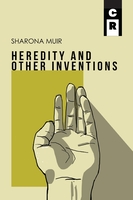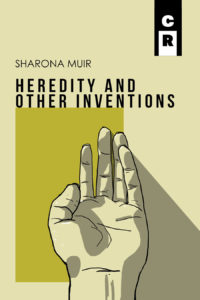***2017 WINTER SOUP BOWL SELECTION***

After the sudden death of her father, a freelance inventor and Holocaust survivor, Sharona Muir discovered that he had invented Israel’s first rocket in the 1940s. These poems arise from her search—ranging from Israel’s public spaces to her own deepest memories—for the meanings of father and daughter, heredity and history, as she ponders the fact that “my DNA is bound up with the State.” While Muir has stories to tell, her poetry’s intelligence, power, and formal beauty transform personal and historical perspectives into “the human truth you survived so it might answer you.”
 A LOOK INSIDE
A LOOK INSIDE
First Published in The Paris Review
CLOUDS OVER JERUSALEM, IN WINTER
As if they were trying to build on a different thought
the clouds accumulate between sun and the city,
so the beams go wide and break into sheaves of light.
It is as if the clouds were trying to reflect the city
without interference of what makes objects and colors
hard and sharp. From the washed, pale stone they are the breath
between our words, and the sound of Shiloah running underground
released to the upper air, so soft, so limitless.
They are like the explosion between a woman and her lover,
spears, fountains, pregnancies of air, sleep’s furrows,
changing without changing their nature,
and one bedsheet rumpling on a line is like a child to them.
They are the builders who would take us up in their arms,
but they have built only a Jerusalem of thoughts.
From the sides of the clouds bloom our epic episodes,
bloodless. Bloodless.
HYPE
Sharona Muir’s Heredity and Other Inventions is a strikingly original collection linking the speaker to her late father who built Israel’s first rocket. These exquisite poems engage science, technology, and a legacy of war. Muir makes history real—its participants and its bloodline.
–Denise Duhamel, author of Blowout
Sharona Muir’s poetry collection Heredity and Other Inventions explores the speaker’s relationship with her father and his astonishing contribution to military technology, while simultaneously encouraging readers to consider their own connections to family, place, and history. In “The Recoilless Cannon,” situated in Haifa in 1995 and within the confines of a secret Ministry of Defense museum, the speaker views a cannon built by her late father and remarks, “so I, whose DNA is bound / up with the state’s defense, / discover my father’s cannon was a water-pipe // until its end, shaped like a flowerpot…” Muir has a gift for conjuring beauty in the least expected places, dazzling audiences with rich imagery such as “peaches, hairy peaches, cherries, / lemons, melons, two lanes of people, parsley, loquats, pita and sesame / and poppy breads,” just a sampling of the delights present in a poem titled “The Most Unsafe Market in Jerusalem.” While the speaker’s narrative is particular to her unique experience, in many ways this chapbook’s poems transcend place and time, and resonate with all who have looked to the past for a way of understanding the present.
–Mary Biddinger, author of Small Enterprise
Shuttling between fatherland and father’s laboratory, between earth and air, between inherited and invented forms, the poems in Sharona Muir’s Heredity and Other Inventions radiate like elements discovered late at night after years of searching. Objects take on auras that shrug off symbolic resonance and insist upon the wonder and horror of the real: a rocket in a museum in another country is both public knowledge and family secret; a daughter’s umbilical cord in her father’s lab sparks questions about the uses of love; the body of an airplane holds the imagined gestures of humans in their final moments of life. Through these objects and events, Muir renders the physical world so unflinchingly that the metaphysical blows back, in equal and opposite reaction, like the exhaust from the airborne vessels that haunt this collection. Urged on by song, prayer, and ekphrasis, the speaker is a historical body that enters rooms seeking information and leaves with questions that puzzle out alternative ways of knowing. If heredity itself is an invention, these poems are an act of postmortem collaboration: daughter as witness to history, using language to weld and spark familial bonds and to summon up their mysteries.
–Becca Klaver, author of LA Liminal
